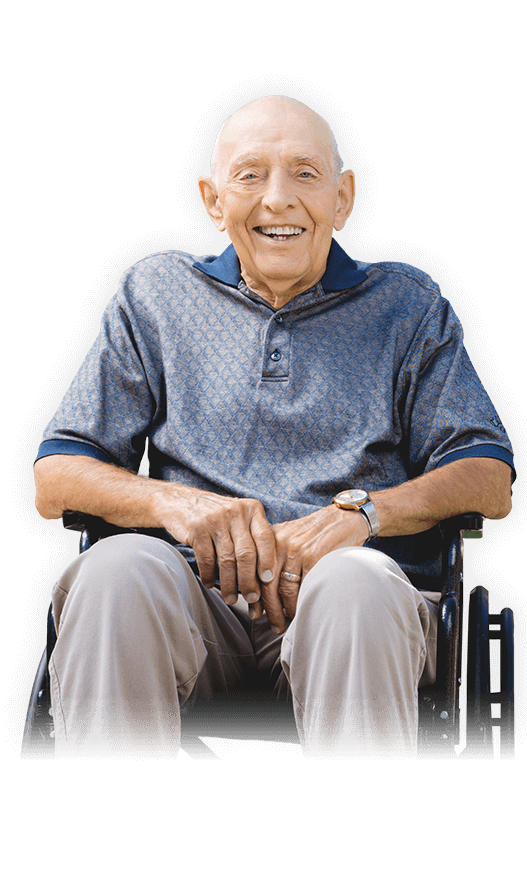In-Home
Palliative care for the elderly at home brings medical support right to the senior’s doorstep. A team of nurses, aides, and specialists visit regularly to manage pain, monitor symptoms, and provide guidance and comfort to the entire family.
You can schedule a consultation with a care provider now.
Please submit this form below and we will chat shortly!
For a free e-book complete the form below
Learn about the Exciting Opportunities with Always Best Care!
When someone you love is facing a serious illness, like cancer or late-stage dementia, comfort becomes just as important as treatment.
Palliative care for seniors offers more than pain relief. It brings peace of mind, eases daily burdens, and supports the entire family during life’s most difficult moments.
Palliative care for the elderly at home allows individuals to receive expert support in the comfort of their own surroundings.
This type of care can begin early, starting right after diagnosis, and continue alongside treatments such as chemotherapy or cognitive stimulation therapy.

While palliative care can begin early, sometimes right after a diagnosis, hospice care often comes into play later.
Hospice is typically reserved for someone who is in the last stages of life, when curative treatments have stopped, and the focus shifts entirely to comfort.


Palliative care for the elderly at home brings medical support right to the senior’s doorstep. A team of nurses, aides, and specialists visit regularly to manage pain, monitor symptoms, and provide guidance and comfort to the entire family.
Seniors who can travel are cared for at a clinic, where doctors and nurses offer support, ease symptoms, and help ensure comfort throughout treatment.
If a senior is admitted with a serious illness, the hospital’s care team steps in to manage symptoms and support care decisions.
Many in-home nursing facilities offer palliative care to residents with complex or ongoing health needs. The goal is to keep them comfortable, surround them with support, and honor their dignity every step of the way.
Palliative care helps soothe distressing symptoms like pain, breathlessness, fatigue, nausea, poor appetite, and constipation; bringing comfort when it’s needed most.
It also addresses emotional symptoms such as anxiety and depression.
Serious illness can take an emotional toll. Research shows that people living with chronic disease and depression often experience more intense symptoms from both conditions.
That’s why palliative care teams often include counselors and social workers to help seniors cope with stress, grief, and depression.
When care decisions get complicated, palliative providers help clarify goals, whether it’s continuing treatment or shifting to comfort.
They guide advanced care planning, support choices that reflect the senior’s values, and handle documents like power of attorneys and living wills.
Since over 70% of U.S. adults consider religion important, it’s natural that spirituality holds a meaningful place in how many people experience care.
In palliative care, aides honor each person’s beliefs and traditions by offering support through prayer, meaningful rituals, or quiet moments of reflection.
Caring for a loved one can be overwhelming and can potentially lead to burnout.
That’s why palliative care also supports family members, offering help with tough decisions, connecting them to respite care services, and simply being there when things feel too heavy to carry alone.
Like most forms of treatment, palliative care comes with its own set of challenges. Here are some of the most common hurdles families and care teams may face.
Talking openly about serious illness, pain, or the possibility of passing away can be deeply uncomfortable for both patients and families.
Some avoid these discussions out of fear or uncertainty, while others may struggle to express their needs clearly.
As a result, important care decisions may be delayed or made without truly understanding the patient’s wishes.

At Always Best Care Senior Services, we take the time to truly listen to seniors, their families, and their doctors, so we can build a care plan that actually fits.
When everyone’s on the same page, providing care feels less stressful and a whole lot more meaningful.
Beyond symptom relief, the team offers emotional and spiritual support, helping seniors find comfort, meaning, and peace through every stage of care.
Our role goes beyond easing pain. We’re here to help seniors find comfort, meaning, and moments of joy, even in the midst of serious illness.
Senior palliative care is specialized support for older adults facing serious health conditions.
The goal isn’t to cure illness. It’s to make life more comfortable by managing pain, easing symptoms, and reducing stress, whether physical, emotional, or both.
Palliative care doesn’t replace treatment. It works alongside it, providing extra support for seniors with conditions like cancer, heart disease, or dementia.
Palliative care offers a wide range of support depending on what the patient needs.
That support can range from pain and symptom relief to emotional and spiritual care, help with everyday tasks, and guidance during tough medical decisions.
Anyone living with a serious illness can benefit from palliative care, regardless of age, diagnosis, or stage of treatment.
It’s most effective when introduced early and used alongside treatments aimed at recovery or prolonging life.
Yes, palliative care can absolutely be done at home. It focuses on relieving symptoms and supporting the whole person, not just medically, but also emotionally, spiritually, and socially.
Care teams can visit your loved one at home or connect through telehealth, making it easier to stay comfortable and supported in familiar surroundings.
It really depends on the person and their needs. Some people receive palliative care for just a few days or weeks, while others can benefit from it for months or even over a year.
It can start at any point in an illness and continue for as long as support is needed.
You might consider palliative care if your loved one is living with a serious illness and their symptoms, like pain, fatigue, or shortness of breath, are affecting their daily life.
It’s also worth exploring if they’re making frequent hospital visits, feeling overwhelmed by treatments, or if you’re noticing increased emotional or spiritual distress.
No, palliative care isn’t just for end-of-life situations. It can begin at any stage of a serious illness, even while someone is still receiving treatment and working toward recovery.
Think of it as added support that focuses on comfort as much as care.
Yes. Palliative care can happen alongside treatment like chemotherapy, surgery, or other therapies. It helps manage the side effects and stress that often come with those treatments.
For instance, if your loved one is feeling weak, anxious, or in pain, palliative care steps in to ease that burden, so they can focus on healing and living life to the fullest.
Palliative care for cancer focuses on improving quality of life by easing pain, managing side effects, and providing emotional and spiritual support.
Care is delivered by a team of professionals who work alongside your doctors to support both the patient and their family.
Find compassionate care that brings comfort, dignity, and support to your loved one when they need it most.

